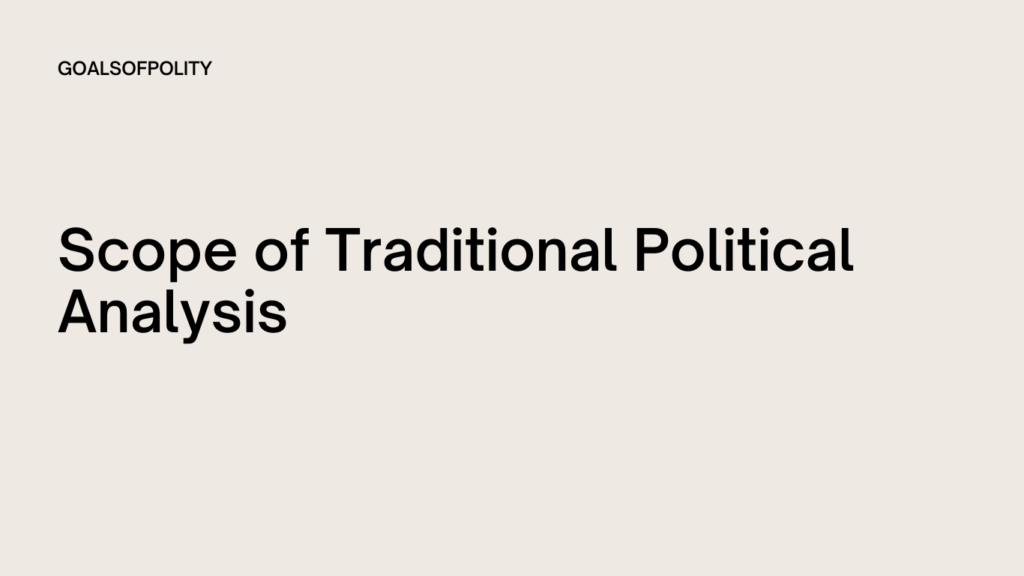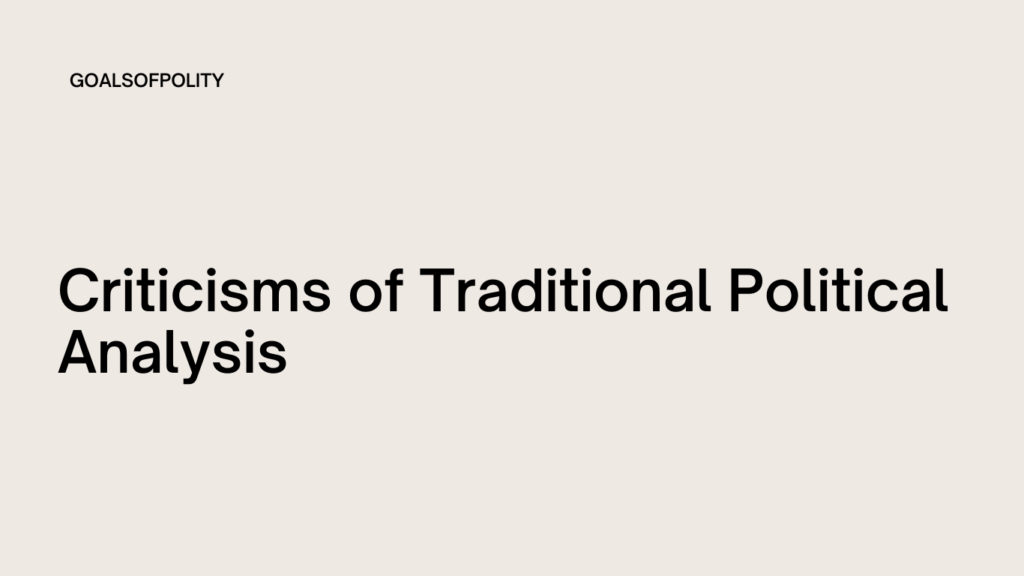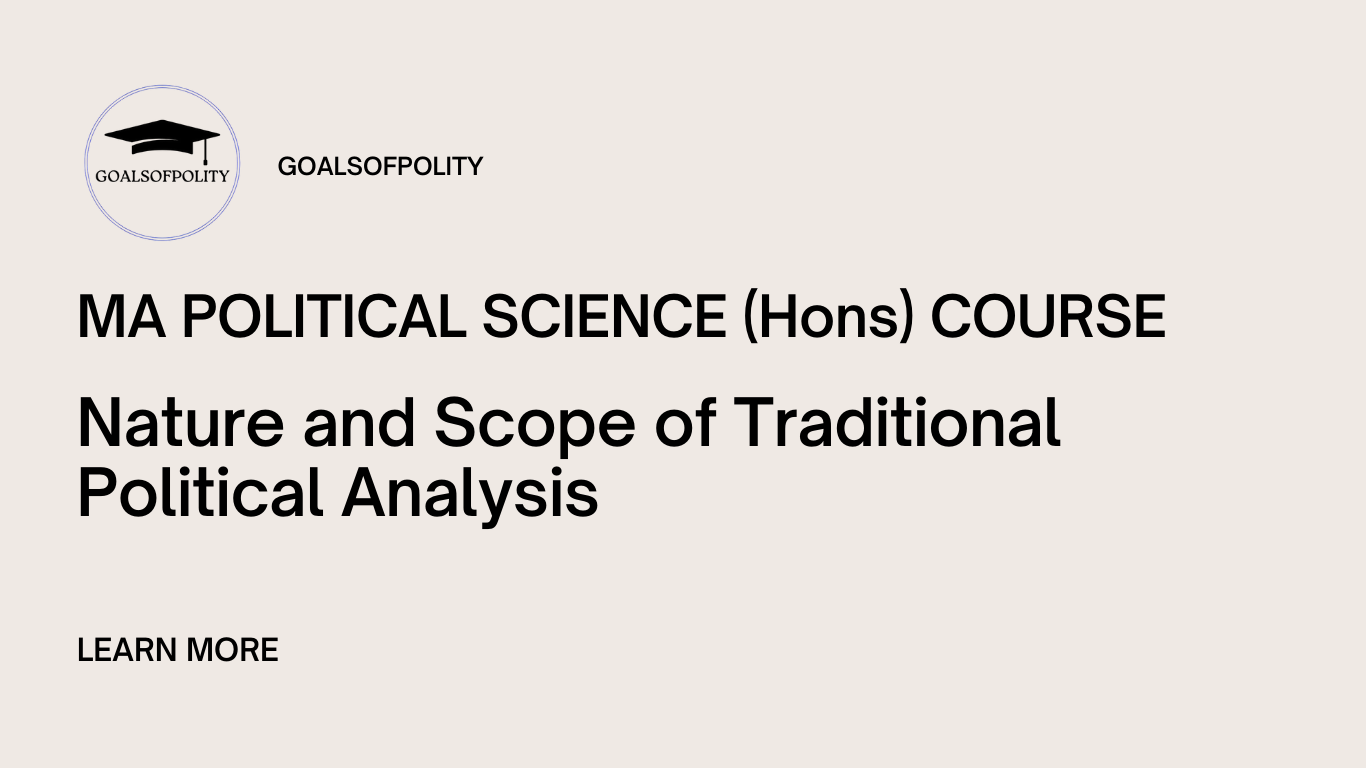Table of Contents
Introduction:
Traditional political analysis refers to the study of political phenomena using classical methods, which focus on normative and philosophical approaches. The mid-20th century is when behaviorism and other modern approaches began to emerge. The traditional approach is deeply rooted in the works of philosophers such as Plato, Aristotle, Machiavelli, and Hobbes, and emphasizes the study of political institutions, statecraft, law and justice, and the nature of power.
Key features:
1. Normative Focus:
Traditional political analysis is primarily normative, concerned with “what is” rather than “what ought to be”. It deals with moral and ethical questions, such as the ideal form of government, justice, and the good life.
2. Philosophical Orientation:
This approach is largely influenced by political philosophy, which examines the fundamentals of political systems and human nature. It is more concerned with abstract concepts rather than empirical data.
3. Institutional Focus:
Traditional political analysis emphasizes the study of formal political institutions, such as the state, government structure, and legal framework. It often assumes that these institutions shape political behavior.
4. Historical Approach:
Traditional political analysts often use historical methods to understand political events. They believe that understanding the past is necessary to understand current political systems and predict future trends.
5. Descriptive and Prescriptive:
The traditional approach is descriptive, providing accounts of political institutions and processes, and perspectival, providing recommendations on how political systems should be organized.
Scope:

6. Study of the State and Sovereignty:
Traditional political analysis places significant emphasis on the state as the central unit of analysis. It explores the nature of sovereignty, the role of the state in society, and the relationship between the state and individuals.
7. Political Philosophy and Theory:
This approach is deeply engaged with political theory, including the works of classical philosophers. It explores ideas such as democracy, authoritarianism, justice, and freedom.
8. Constitutional Studies:
Traditional political analysis involves examining the constitution, law, and the legal framework within which political systems operate. It emphasizes the role of law in maintaining order and justice.
9. Political Institutions:
The study of political institutions such as parliament, the executive, and the judiciary is the main focus. This approach examines how these institutions work and what impact they have on political life.
10. International Relations and Diplomacy:
Traditional political analysis also extends to the study of international relations, focusing on diplomacy, war, and the balance of power between states.
Criticisms:

11. Lack of Empirical Rigor:
Critics argue that traditional political analysis lacks empirical rigor and relies too much on abstract reasoning and normative judgments.
12. Overemphasis on Institutions:
Traditional approaches often ignore the role of individuals and informal political processes, focusing instead on formal institutions.
13. Neglect of Behavioral Aspects:
Traditional political analysis ignores behavioral aspects of politics, such as voting behavior, public opinion, and the role of interest groups.
14. Eurocentrism:
The traditional approach is often criticized for being Eurocentric, focusing primarily on Western political ideas and institutions while neglecting non-Western approaches.
Conclusion:
Traditional political analysis has played a foundational role in the development of political science as a discipline. Although it has been criticized for its normative focus and lack of empirical rigor, it remains an essential approach to understanding the philosophical and institutional dimensions of politics. The insights provided by classical political thinkers continue to influence modern political theory and analysis. Despite the rise of modern approaches such as behavioralism and systems theory, traditional political analysis still provides valuable perspectives on the nature of political power, institutions, and the state.
FAQs:
1. What is traditional political analysis?
It is a normative and philosophical approach to studying politics, which emphasizes the moral, ethical and idealistic aspects of governance.
2. Who are the major thinkers in traditional political analysis?
The major thinkers include Plato, Aristotle, Machiavelli, Hobbes, Locke, Rousseau, and Marx.
3. What is the main difference between traditional and modern political analysis?
Traditional political analysis focuses on normative and philosophical questions, while modern political analysis emphasizes empirical and scientific methods.
4. What are the major characteristics of traditional political analysis?
The major characteristics include a philosophical approach, normative orientation, value-based analysis, emphasis on institutions, and reliance on qualitative methods.
5. Why is traditional political analysis still relevant?
It provides insights into moral reasoning, fundamental political ideals, and ethical dimensions of governance that are essential for understanding political life.

